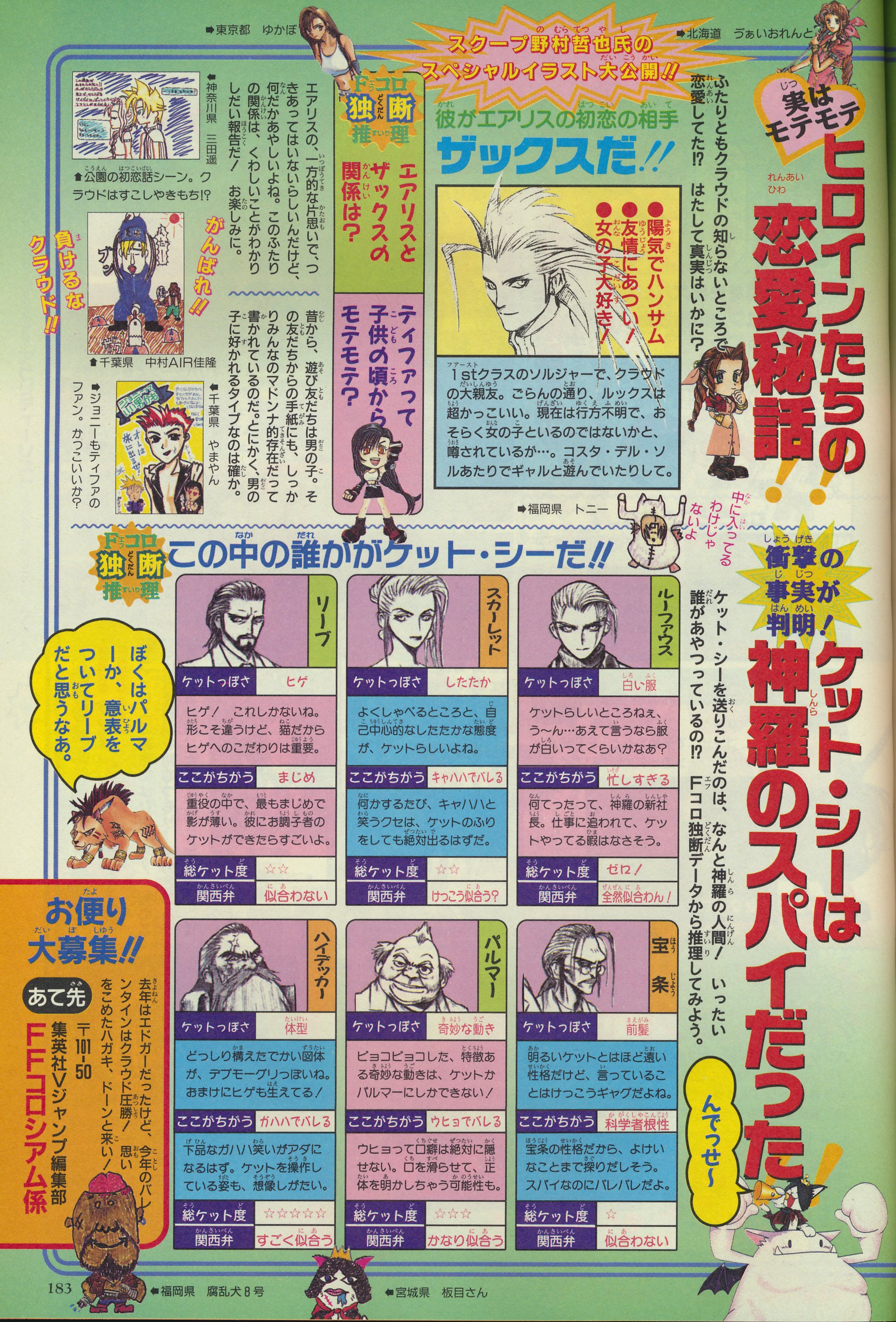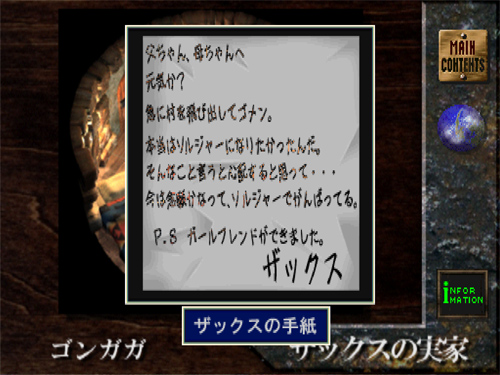To be fair, something like
Fist of the North Star is one of the best-selling mangas of all time, ran from 1983-1988,
and to this day has STILL never had a completed English translation... so it's not really 90s Squaresoft not giving us these sorts of very obscure little marketing promotions & magazine bits for
Final Fantasy VII from before it was even a significantly historical game, so much as it is they're just things that were designed specifically for the Japanese audience and wouldn't have any viable way to deliver them outside of that scope. That being said, I still do have a massive bone to pick around this particular thing.
Despite being a much more open & global economy, Japan still has a LOT of Japan-centric economic things that don't really operate in a way that's got a means to scale outside of that localized market. That's why there's always going to be just an absolute metric shitton of promotion & neat merch that's perpetually Japan-specific where anyone outside with interest in those niche things is gonna have to find ways around that to get a hold of it.
While a lot more of that stuff is internationally available these days to the point where something like the
Advent Pieces PS3 that released with
Advent Children seems like it would be more likely to be released internationally... the
Hero Edition & Collector's Edition of Crisis Core Reunion were both Japan-specific. So, even places like SE that now have international branches of the company that translate, localize, & distribute those things... there's
STILL a lot of stuff where the overall interest is seen as small enough that it doesn't bypass that economic barrier of distribution
even for something that's INSANELY popular globally.
This is exactly why a lot of online manga sites exist that host unofficial scanslations in multiple languages, and then remove them as soon as official versions are made available, because they're just carefully operating as a middleground to provide a distribution that literally doesn't & couldn't exist otherwise, while never holding anything where that license is viable to be targeted. It's the same way that ordering things online & getting unofficial burned DVDs with bootleg English subtitles that LOOKED legit was a whole big thing that boomed online at the same time as that kicked off. Someone could pull that off for reasonably cheap, and only needed to make enough money to offset the cost to themselves for a minor profit at best – which is totally different from the operational cost of needing to be able to make and distribute approved official versions of something so that it all stays under one roof, and has actual quality control that is up to what the source material's is. It became a bigger issue as soon as there's anything that looks like profiting off of material someone doesn't own OR costing the profits of a company that wants to make money from that traffic themselves.
The alternative to doing it themselves is locally licensing it, and I can't even begin to express the frustration about how initially that resulted in the era of the license-holder censoring, cutting, altering the dialogue when dubbing, and re-editing the content however they wanted – because they owned the license to it (
hence the famous "no cuts" threat including mailing a physical katana to Harvey Weinstein with Princess Mononoke). That's what happened with a bunch of the older
Godzilla films and is why finding the names for them is its own headache, but even without that issue being as commonplace and with subtitled version of the full and unmodified versions of the original films – all of the
Godzilla films don't and CAN'T exist online in a single location if you live outside of Japan, because the licensing is just shotgunned out across whoever could afford to handle it at the time. That's the same reason why things like individual international licensing continually abandons something like official releases of
Fist of the North Star continually getting restarted over from scratch rather than being completed.
Suffice to say that, even when official versions of something DO exist, they can STILL somehow become preventatively difficult to actually acquire anyway, such that the difference in whether or not they're ever made available officially sort of just becomes a moot point – which is what means that the viability for official versions don't make up the cost for distribution and the cycle continues. Basically it just falls into the purview of places attempting to preserve that information... but then that just comes full circle to when that level of preservation gains too much attention when something becomes popular and fans are left looking to the only place that said information exists... resulting in things like
Square Enix sending a C&D and summarily obliterating the MASS of collectively preserved content in the Accord's Library at the end of 2024 ...while the Internet Archive was down, making it impossible for that to be backed up at all. (Even the site itself is gonna go offline for good in July this year)
It sucks because that hurts exactly only one demographic – the people who actually care passionately about the material enough to preserve it.
This is one of the things that's really irked me a LOT over the last two decades, where there are passionate fans who WANT to be able to engage in helping to distribute content in a way that bypasses language & access barriers and we have the time, drive, and resources to do so –
simply because we CARE about it... but the only way to do that is that we have to operate continually in an EXTREMELY delicate balance to not overstep this unclear boundary of a continually moving goalpost that could be planted somewhere new at any time. There's no way to establish a viable middle-ground that lasts, but even WORSE is that when that goalpost gets shifted, there's ZERO onus on the owner to ever make that available themselves and provide that service for the EXACT same reason that whenever someone else obtained the license for something – they could alter or restrict access to that any way that they want.
Back in the
Advent Children Dot Net days, there was a LOT of active care taken to match the appearance of everything to ensure that it was reputable & people could trust it, but not TOO official such that anything there was seen as being officially sanctioned by SE themselves at which point you'd get instantly shut down with a C&D. Fan sites have to archive content like that that will never exist elsewhere only because the official license-holder can't ever afford to do something like that or wont do that for the aforementioned reasons. It's also linked to the same reason that Facebook, Reddit, & YouTube rely on communities to self-moderate, because they could NEVER employ people at scale to make that work... and once there's an investment in something that hit a particular critical mass you couldn't ever take it on – and it might actually be a worse option for everyone for the same reason that it's so obnoxious to find versions of the pre-Special Editions of
Star Wars from the license holder, rather than from people who just have those versions. If the license holder doesn't want those things to have an audience, they'll erase them to the best of their ability.
It's why big corporations can produce entire films that are the work of countless people and then just never release them, or vanish shows from a streaming service as a tax write-off because they don't want to have to keep paying the creators, and they already made THEIR money from it. It's like how there's technically nothing to stop private collectors from refusing access to something that they own, and claiming a loss of value if that information is released. It's a whole corporate system of playing with projected value and impacting stock prices that isn't really about the content itself, but moreso about manipulating the structure for that content. It's also why there's a lot of risk to things like the Internet Archive in general, but that's also what brought about the complexities here... because those things don't exist in the same way in various countries.
The biggest reason for that disconnect being amplified around content from Japan is most apparent when it comes to streaming. While
Nintendo has a long history of being notoriously uncool about streaming compared to how it seems like a lot of other Japanese companies are ok with it, and only VERY recently being less aggressive about blocking scenes from being screen-captured... those restrictions look VERY different if you're IN Japan.
A big example is that
FromSoftware allows people to stream their games, but generally with things like Bits & Donations disabled, so that they can still grow an audience by sharing the content, but they're not directly monetizing it. That's because if you want to stream ANYTHING, you need direct & explicit permission from the license-holder. Case in point, if you're a Japanese streamer you cannot show the FMV or scene of Aerith's death while streaming
Final Fantasy VII, and you ALSO can't show any of the ending of
Crisis Core either. It's always frustrating watching JP streamers being gut-punched emotionally and then having to suddenly break themselves out of the experience to cut their streaming feed in a panic while trying to stay in the moment of the story. That's something that Western streamers never have to worry about, because copyright is very different and there isn't a legal framework to make it viable to go after it on a case-by-case basis. While it's easier to point to how that's a positive impact, and while it's toned down some big Japanese companies over time... that's not the only issue.
When it comes to retro games if that Japanese license holder has gone under or otherwise vanished off of the face of the Earth – that means that the answer is a defacto
"NO." rather than the way that abandoned licensing is much closer to a defacto
"YES." elsewhere. This means that you could get approval from multiple people in a chain of ownership, but if there's ANY point where the line of contact reaches a dead end of a business entity that doesn't exist –
everything's shut down and all permissions are revoked. That's how that hierarchy works and that structure itself is what has near-absolute control in the Japanese business world EVEN WHEN IT LITERALLY NO LONGER EXISTS, the phantom of that thing will uphold removing it in a way that's contradictory to how other places would release it under the same circumstances.
This is what feeds right back into the preservation of some Japanese-specific retro gaming and other digital content preservation of Japan-specific content being actively pushed OUTSIDE of Japan into the small clusters of passionate fans being the only place that those things have any viable possibility of reaching an audience who's interested. It's why that's also ensuring that everything is simultaneously forced to operate in this necessarily obnoxious grey area up until it's meaningful enough to go after monetarily – which often only becomes true because someone does SUCH a good job of preserving content and nurturing a community around something obscure that the license-holder sees it as financially viable to revive or expand that content, or that it's placing some other distribution at risk.
While we're VERY mildly shielded from one part of that thanks to
FFVII being insanely popular regardless of whether or not TLS exists, it is still always something that involves being reminded of all the tip-toeing whenever I think about preserving these sorts of things in a format OTHER than just the absurd private collection of various physical materials that I've managed to amass over the years, which doesn't include niche magazines like this (as that's not really what I got into collecting), and how sharing the translations and understanding that you can mine from those snapshots in time have a value all their own that exists outside of the material itself.
It's still the sort of thing that makes awesome little bits of information like this why... I'm actually glad that they get preserved indirectly like this, because it's harder for them to ACTUALLY disappear in a way that becomes unreachable
– specifically because we're some of the only people who would possibly ever care about them.























